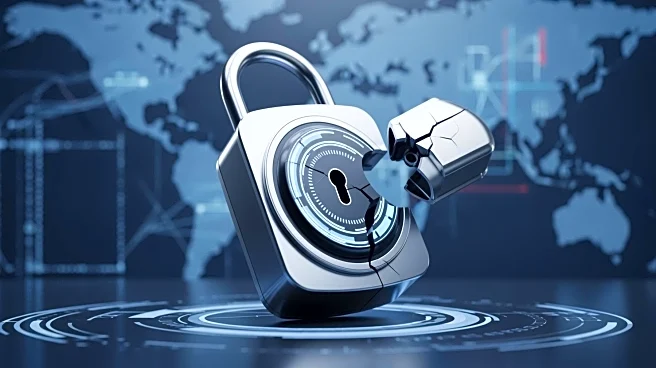What's Happening?
Jaguar Land Rover (JLR) experienced a significant cyber-attack in August 2025, which has been identified as the most economically damaging cyber event in the UK. According to the Cyber Monitoring Centre
(CMC), an independent UK-based organization, the attack resulted in a financial impact of £1.9 billion ($2.55 billion) and affected over 5,000 UK organizations. The attack led to substantial disruptions in JLR's manufacturing operations, including a shutdown of its IT environment and a halt in global manufacturing operations at major UK plants in Solihull, Halewood, and Wolverhampton. The incident also caused intermittent availability of dealer systems and led to canceled or delayed orders for suppliers. The CMC categorized the event as a 'Category 3' systemic cyber event, based on its total cost and the number of people affected.
Why It's Important?
The cyber-attack on JLR highlights the vulnerability of major manufacturing operations to cyber threats and the potential for significant economic repercussions. The £1.9 billion loss underscores the critical need for robust cybersecurity measures in protecting not only individual companies but also the broader economic infrastructure. The incident serves as a wake-up call for industries reliant on complex supply chains, emphasizing the importance of securing IT environments to prevent operational disruptions. The financial impact extends beyond JLR, affecting suppliers and downstream organizations, which could lead to broader economic instability if similar attacks occur in the future. This event may prompt increased regulatory scrutiny and investment in cybersecurity across the manufacturing sector.
What's Next?
In response to the JLR cyber-attack, there may be heightened efforts to strengthen cybersecurity frameworks within the automotive industry and other sectors with complex supply chains. Companies might increase investments in cybersecurity technologies and training to mitigate the risk of future attacks. Regulatory bodies could introduce stricter compliance requirements to ensure that organizations are better prepared to handle cyber threats. Additionally, there may be a push for greater collaboration between private companies and government agencies to enhance national cybersecurity resilience.
Beyond the Headlines
The JLR cyber-attack raises questions about the ethical responsibilities of companies to protect their digital infrastructure and the potential legal implications of failing to do so. As cyber threats become more sophisticated, there is a growing need for companies to prioritize cybersecurity as a strategic risk, comparable to financial or operational threats. This incident may also influence cultural shifts within organizations, encouraging board members and executives to take a more proactive role in cybersecurity governance.










